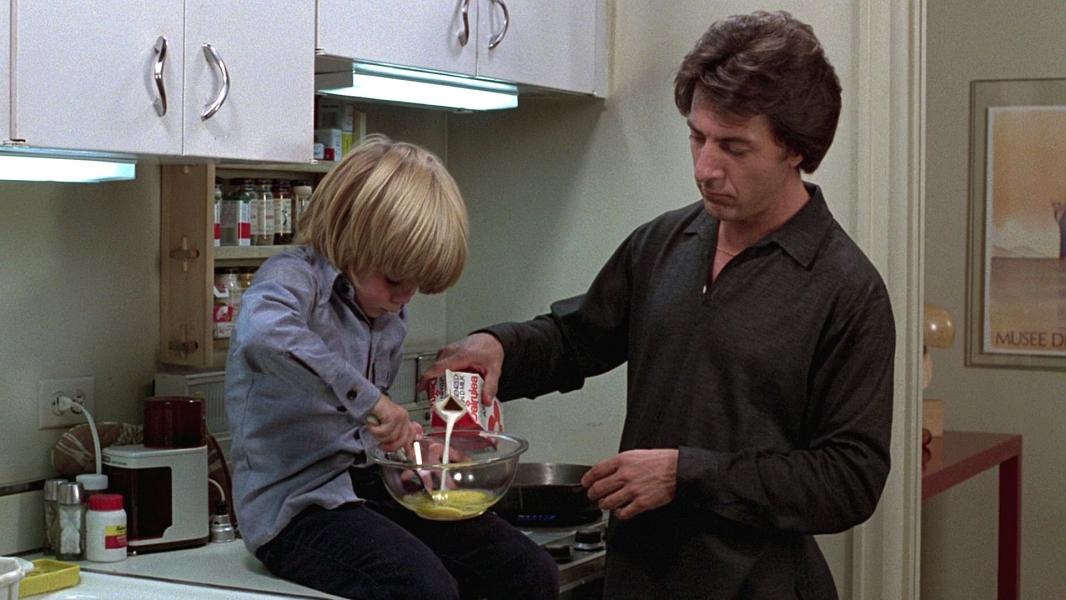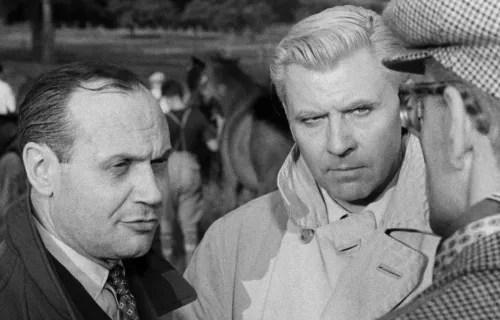
english below
“I’m leaving you. Don’t make me go in there, please. If you do, I swear, one day, next week, maybe next year, I don't know, I'll go right out the window.” Met die gedachte verlaat Joanna (Meryl Streep) haar werkverslaafde en onachtzame man Ted (Dustin Hoffman), die enkel met zichzelf en zijn carrière bezig is. In haar poging om meer uit haar leven te halen, valt echter wel een onschuldig slachtoffer: hun 7-jarige zoontje Billy. Na Joanna’s vertrek, moet Ted de taken opnemen die hij daarvoor verwaarloosde. Van het huishouden tot leren om een aanwezige vader te zijn voor Billy. Net op het moment dat vader en zoon samen een zorgzame en liefdevolle routine hebben gevonden, keert Joanna terug. Ze wil Billy meenemen naar haar nieuwe leven, terwijl Ted gelooft dat Billy hem net zo hard nodig heeft als zijn moeder. Wat volgt, is een verhitte voogdijstrijd, waar beide kanten in de klappen delen.
KRAMER VS. KRAMER behandelt een thema dat in de jaren '70 nog taboe was: scheiding en voogdijschap. De film flirt met actuele onderwerpen, zoals de nood aan evenwaardig partner- en ouderschap, maar in eerste instantie kwam de vader uit het verhaal als de held en de moeder als de boeman. Gelukkig hield actrice Meryl Streep voet bij stuk en benaderde het personage van Joanna vanuit een meer empathische hoek, wat haar meteen haar eerste Oscar opleverde. Filmcriticus Roger Ebert schreef in de Chicago Sun-Times “The characters aren't just talking to each other, they're revealing things about themselves and can sometimes be seen in the act of learning about their own motives. That's what makes Kramer vs. Kramer such a touching film: We get the feeling at times that personalities are changing and decisions are being made even as we watch them.”
KRAMER VS. KRAMER maakt deel uit van het MOMMIE DEAREST-programma, waarin De Cinema peilt naar de kracht van moeders en onze perceptie van het ‘ideale’ moederschap in cinema.
ENG
The film is in English with Dutch subtitles
“I’m leaving you. Don’t make me go in there, please. If you do, I swear, one day, next week, maybe next year, I don't know, I'll go right out the window.” With that realization in mind, Joanna (Meryl Streep) leaves her workaholic and neglectful husband Ted (Dustin Hoffman), who only thinks about himself and his career. However, in her attempt to get more out of her life, there is one innocent victim: their 7-year-old son Billy. After Joanna’s departure, Ted has to take on the responsibilities he neglected before. From doing the housework to learning how to be a present father for Billy. Right when father and son have found a loving routine together, Joanna returns. She wants to take Billy to her new life, while Ted believes Billy needs him as much as he needs his mother. What follows, is a heated custody battle, where both sides share in the hits.
KRAMER VS. KRAMER touches on a theme that was still taboo in the 70s: divorce and custody. The movie flirts with hot topics, such as the need for equal partnership and parenthood, but in the first draft the father was painted the hero and the mother became the bad guy. Luckily, actress Meryl Streep stood her ground and approached the character of Joanna from a more empathetic angle, which earned her her first Academy Award. Film critic Roger Ebert wrote in the Chicago Sun-Times: “The characters aren't just talking to each other, they're revealing things about themselves and can sometimes be seen in the act of learning about their own motives. That's what makes Kramer vs. Kramer such a touching film: We get the feeling at times that personalities are changing and decisions are being made even as we watch them.”
KRAMER VS. KRAMER is part of the MOMMIE DEAREST-series, where De Cinema explores the power of mothers and our perception of the ‘ideal’ motherhood in cinema.



